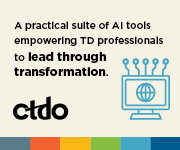|
|
 
 |
| (Agustin Munoz/Getty Images) |
Surfers can't control the ocean, but can learn to read and ride its waves, which mirrors a skill leaders must learn about their business as well, writes Steven Gonzalez, the president & CEO of HealthView Home Health and Hospice & Palliative Care, who notes that waiting for perfect conditions leads to missed opportunities, especially in fast-moving areas like AI. "The goal is not to surf faster, but to stay on the wave longer, guiding others with clarity and purpose," Gonzalez writes.
|
|
|
 | Empower Your TD Strategy with AI
CTDO is redefining how learning leaders leverage AI. Access a practical suite of tools designed to help you align talent strategy with business goals and accelerate your organization's transformation. Get the tools » |
|---|
| |
|
|
 
| |
 |
| (MicroStockHub/Getty Images) |
Poor vision among leaders can prevent them from recognizing how managers are treating employees, which may lead to organizational problems such as eroded confidence and a lack of prompt, aligned action, says S. Chris Edmonds, an executive consultant with The Purposeful Culture Group. Edmonds highlights the importance of proactive observation and feedback systems, sharing an example of a client who uses a simple online feedback form to stay informed about employee and customer experiences.
|
|
 |
| Read more from S. Chris Edmonds on SmartBrief on Leadership |
|
 |
|
|
 | Set Your AI Ambition
Are you focusing your AI efforts where they count? Whether you're scaling experiments or shaping enterprise-wide transformation, this framework identifies the four core zones where AI can create real business value and assesses how each should factor into your AI strategies. Download the report » |
|---|
| |
|
|
 
|
Giving feedback requires courage, especially if the input is negative, since no one wants to get a defensive response, writes Shari Harley, founder and president of Candid Culture, who recommends putting people at ease by asking for feedback, defining what type it should be, thanking them for giving it and deferring any response to negative feedback for later. "You're not being dismissive; you're ensuring your emotions don't take over. If you want to have a second conversation, have it within a week," Harley advises.
|
|
Put it into practice: When you receive negative feedback, tell the person you want to think about what they've said and you will get back to them, Harley writes, noting that anything you say in the moment may sound defensive. "Putting a conversation on hold will require a good deal of self-control, but the rewards are great."
|
|
|
 | Monster-sized fun for a child you love!
Calling all parents, grandparents, and cherished relatives! Delight the young explorer in your life with The Week Junior magazine, packed with science, arts, and world wonders. It's only $2 per issue – less than the cost of a candy bar! Perfect for kids ages 8-14. Try 6 issues Risk-Free today |
|---|
| |
|
|
   
 | [Factsheet] 5 cyber threats to know now
Future B2B is celebrating cybersecurity awareness month by sharing five of the biggest threats of 2025 and providing IT leaders with resources to help employees stay alert, avoid costly mistakes, and strengthen your organization's security posture. Get the factsheet! |
|---|
| |
|
|
 
| | |
